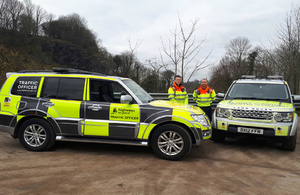Traffic officer patrols to step up during South West holiday season
Highways England will be extending their traffic officer patrols into Cornwall for the first time.

During the upcoming Easter holiday period and over the busy summer months, Highways England traffic officers will patrol and assist incidents on parts of the A30 in Cornwall.
Highways England already works in partnership with Devon and Cornwall Police and forms part of a multi-agency partnership in terms of safety and severe weather handling.
Patrolling of the A30 is a trial initiative to support Devon and Cornwall Police and help to address increased traffic volumes and related incidents on the A30 in Cornwall.
Traffic officers currently assist drivers in any difficulty, co-ordinate the resources of the emergency services, manage traffic to reduce incident-related congestion and clear debris from the carriageways.
Based at both Bodmin police station and Cornwall Council’s Castle Canyke depot during the peak holiday months, they will now be closer at hand to provide assistance along the A30 and A38.
Traffic officers will patrol the A30 between Carland Cross and Lifton Down, and Rob Penney, South West Service Delivery Manager for Highways England, said:
We have assisted with incidents along the A30 before, but we’ve only previously patrolled routinely as far as Daisymount.
The aim is to provide further assistance to motorists on our South West network. We’re delighted to extend our service further south into Cornwall and to continue our close working partnership with Devon and Cornwall Police and Cornwall Council.
At this stage, our traffic officers will only be patrolling the A30 during the holiday months, but there may be scope to increase the patrols in the future, dependent on a review of this trial period.
Chief Inspector Adrian Leisk, head of roads policing for the Devon & Cornwall Police and Dorset Police alliance, said:
Devon and Cornwall Police is delighted to expand its partnership working with Highways England into Cornwall.
This builds on the considerable success of the operational activity on the M5, A38 and A30 in Devon, where Highways England Traffic Officers have supported police resources in dealing with road traffic collisions and other incidents which have the potential to cause disruption on our strategic road network.
This ‘one team’ approach will undoubtedly help support communities and businesses who rely on a resilient and capable road network in Cornwall, during what will be the busiest periods of the year.
Highways England’s Traffic Officer service patrols England’s motorways and major A roads, helping to keep traffic flowing smoothly.
Traffic Officers are not an enforcement agency, but they do have the power to stop and direct traffic, close lanes and carriageways and manage traffic, and road users must obey their directions.
Traffic Officers help to keep roads running smoothly by attending incidents, ensuring the scene is safe, clearing the carriageway of debris, managing debris and supporting the emergency services.
They also deal with broken down and abandoned vehicles on the strategic road network, recovering vehicles that are causing a blockage or hazard, and ensure that the scene of an incident is safe, for road users and working partners.
For more information on the roles and responsibilities of a traffic officer go to our web page Highways England’s traffic officer service.
Over the Easter period, Highways England is removing some 300 miles of roadworks to make journeys better for drivers and their passengers. That means around 99 per cent of motorways and major A-roads will be roadworks-free in time for Easter.
And Highways England is also calling on drivers to do their bit and check their vehicle before setting off to avoid breakdowns, and keep the road network flowing freely.
Research shows almost half of all breakdowns are caused by simple mechanical problems which could be avoided with simple checks and nearly a quarter are caused by tyre problems.
Before setting off on journeys, motorists are advised to:
- check fuel: make sure you have enough to get to your destination.
- check tyres: check your tyre pressure and the condition of your tyres, including the spare. Look out for cuts or wear and make sure the tyres have a minimum tread depth of 1.6mm, which is the legal limit.
- check engine oil: use your dipstick to check oil before any long journey, and top up if needed. Take your car back to the garage if you’re topping up more than usual.
- check water: to ensure you have good visibility, always keep your screen wash topped up so you can clear debris or dirt off your windscreen.
- check your lights: if your indicators, hazard lights, headlights, fog lights, reverse lights or brake lights are not functioning properly, you are putting yourself at risk. In addition, light malfunctions can be a reason for your vehicle to fail its MOT.
Christian Morgan, South West operations manager for Highways England, said:
Traffic volumes increase in the South West during holiday periods and breakdowns and other incidents can cause issues on our network during these busy times.
Safety is our top priority and we advise all motorists to carry out a few simple vehicle checks before setting off over this period.
General enquiries
Members of the public should contact the Highways England customer contact centre on 0300 123 5000.
Media enquiries
Journalists should contact the Highways England press office on 0844 693 1448 and use the menu to speak to the most appropriate press officer.